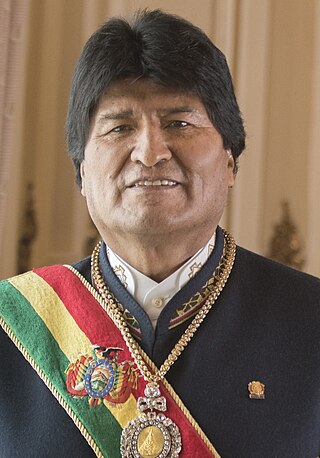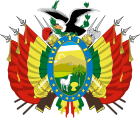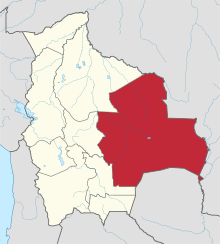
The politics of Bolivia takes place in a framework of a presidential representative democratic republic, whereby the president is head of state, head of government and head of a diverse multi-party system. Executive power is exercised by the government. Legislative power is vested in both the government and the two chambers of parliament. Both the Judiciary and the electoral branch are independent of the executive and the legislature. After the 2014 Bolivian general election, 53.1% of the seats in national parliament were held by women, a higher proportion of women than that of the population.

Juan Evo Morales Ayma is a Bolivian politician, trade union organizer, and former cocalero activist who served as the 65th president of Bolivia from 2006 to 2019. Widely regarded as the country's first president to come from its indigenous population, his administration worked towards the implementation of left-wing policies, focusing on the legal protections and socioeconomic conditions of Bolivia's previously marginalized indigenous population and combating the political influence of the United States and resource-extracting multinational corporations. Ideologically a socialist, he led the Movement for Socialism (MAS) party from 1998 to 2024.

The Bolivian Gas War or Bolivian gas conflict was a social confrontation in Bolivia reaching its peak in 2003, centering on the exploitation of the country's vast natural gas reserves. The expression can be extended to refer to the general conflict in Bolivia over the exploitation of gas resources, thus including the 2005 protests and the election of Evo Morales as president. Before these protests, Bolivia had seen a series of similar earlier protests during the Cochabamba protests of 2000, which were against the privatization of the municipal water supply.

Pando is a department in Northern Bolivia, with an area of 63,827 square kilometres (24,644 sq mi), in the Amazon Rainforest, adjoining the border with Brazil and Perú. Pando has a population of 130,761. Its capital is the city of Cobija.

Santa Cruz is the largest of the nine constituent departments of Bolivia, occupying about one-third (33.74%) of the country's territory. With an area of 370,621 km2 (143,098 sq mi), it is slightly smaller than Japan or the US state of Montana. It is located in the eastern part of the country, sharing borders in the north and east with Brazil and with Paraguay in the south.

The current Constitution of Bolivia came into effect on 7 February 2009 when it was promulgated by President Evo Morales, after being approved in a referendum with 90.24% participation. The referendum was held on 25 January 2009, with the constitution being approved by 61.43% of voters.

A constitutional referendum was held in Bolivia on 25 January 2009, postponed from the initially planned dates of 4 May 2008 and then 7 December 2008. Drafted by the Constituent Assembly in 2007, the new constitution was approved in the referendum according to an exit poll by Ipsos Apoyo for La Razón and ATB, a Bolivian television network. Furthermore, it required early elections to be held on 6 December 2009.

The Media Luna or Media Luna Ampliada refers to a group of four departments – Santa Cruz, Beni, Pando, and Tarija – in Bolivia which are home to a greater proportion of opponents to the national government led by Evo Morales and the Movement for Socialism (MAS) than the rest of the country. Pando has seen increasing support for MAS since 2009, while Tarija was initially supportive but has opposed MAS in every election after 2014. In contrast to the predominantly Indigenous Andean populations of the Andean region such as La Paz and Cochabamba, the departments in the Media Luna are majority mestizo, as well as being made up of the remaining 26 groups of lowland indigenes with white minorities, specifically in Santa Cruz de la Sierra.

The Bolivian Constituent Assembly, convened on August 6, 2006, in Sucre, with the purpose of drafting a new national constitution by December 14, 2007; extended from the original deadline of August 6, 2007. The Assembly approved the new Political Constitution of the State on 9 December 2007. It was put to a national referendum held on 25 January 2009, and went into force on 7 February 2009.
Events from the year 2007 in Bolivia

A vote of confidence in President Evo Morales in the form of a referendum was held in Bolivia on 10 August 2008. The vote was held to determine whether Morales, Vice President Álvaro García Linera, and eight out of nine departmental Prefects should stay in office. Morales received more than 67% support and six of the eight prefects were returned. The prefects of Cochabamba Department and La Paz Department were defeated and had to face re-election.

Referendums on departmental autonomy statutes were held in four departments of Bolivia—Beni, Pando, Santa Cruz, and Tarija—in May and June 2008. These four departments, known as the Media Luna, voted in favor of autonomy in the June 2006 elections. The National Electoral Court had blocked the referendums, along with the proposed referendum on Morales's new constitution. The referendums were also unconstitutional, as the constitution in force at the time had no provisions for departmental autonomy. Under the Framework Law on Autonomy, passed in 2010, the autonomy statutes must be harmonized with the 2009 Constitution before being enacted.

An autonomy referendum was held in Tarija Department in Bolivia on 22 June 2008, following the autonomy referendum held in Santa Cruz Department on 4 May 2008 and the autonomy referendums held in Beni Department and Pando Department on 1 June 2008.

The Santa Cruz Youth Union (UJC) is a far-right movement based in Santa Cruz, Bolivia. Founded in 1957 as an arm of the Pro Santa Cruz Committee, the UJC has recently become the subject of controversy and accusation concerning its activities in support of the Santa Cruz autonomy movement in opposition to the government of Evo Morales and his MAS political party.
Leopoldo Fernández Ferreira is a Bolivian politician. A member of Social and Democratic Power (PODEMOS) Fernández was Prefect (Governor) of the northern Bolivian department of Pando from 2006 to 2008.

General elections were held in Bolivia on December 6, 2009, following a constitutional referendum held on 25 January 2009. The election was initially expected to be held in 2010. Voters elected:
The Porvenir massacre was a deadly ambush in the early hours of September 11, 2008, allegedly organized by Prefectural authorities of the Bolivian Department of Pando, as part of a civil coup d'état against the government of Evo Morales by members of the right-wing civic movement. As a result of the ambush, at least 12 indigenous protesters of the municipality of El Porvenir died that day.

The Presidency of Evo Morales began on January 22, 2006 when Evo Morales was inaugurated as the 80th President of Bolivia, following his victory in the 2005 general election, where he won 53.7% of the vote, defeating Jorge Quiroga, Samuel Doria Medina, and several other candidates. Morales increased taxation on the hydrocarbon industry to bolster social spending, emphasising projects to combat illiteracy, poverty, racism, and sexism. Vocally criticizing neoliberalism and reducing Bolivia's dependence on the World Bank and International Monetary Fund, his administration oversaw strong economic growth while following a policy termed "Evonomics" which sought to move from a liberal economic approach to a mixed economy. Scaling back U.S. influence in the country, he built relationships with leftist governments in the Latin American pink tide and signed Bolivia into the Bolivarian Alliance for the Americas. Attempting to moderate the left-indigenous activist community, his administration also opposed the right-wing autonomist demands of Bolivia's eastern provinces. Winning a recall referendum in 2008, he instituted a new constitution that established Bolivia as a plurinational state and was re-elected in 2009. His second term witnessed the continuation of leftist policies and Bolivia's joining of the Bank of the South and Community of Latin American and Caribbean States; he was again reelected in the 2014 general election. Following the disputed 2019 general election and the ensuing unrest, Morales resigned and flew to Mexico where he had been granted political asylum.

The Indigenous peoples in Bolivia or Native Bolivians are Bolivians who have predominantly or total Amerindian ancestry. They constitute anywhere from 20 to 60% of Bolivia's population of 11,306,341, depending on different estimates, and depending notably on the choice Mestizo being available as an answer in a given census, in which case the majority of the population identify as mestizo, and they belong to 36 recognized ethnic groups. Aymara and Quechua are the largest groups. The geography of Bolivia includes the Andes, the Gran Chaco, the Yungas, the Chiquitania and the Amazon Rainforest.

The 2021 Bolivian regional elections were held on 7 March 2021. Departmental and municipal authorities were elected by an electorate of approximately 7 million people. This was the third regional election under the 2009 constitution. It was postponed from the expected date of 2020 due to the 2019 Bolivian political crisis and delays in holding the 2020 Bolivian general election. All elected authorities assumed office on 3 May.











